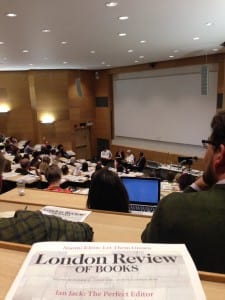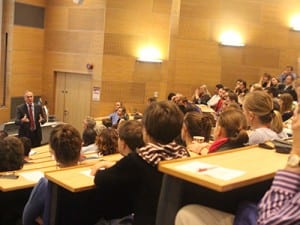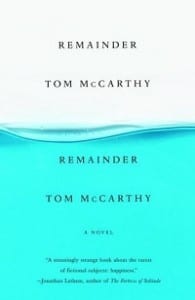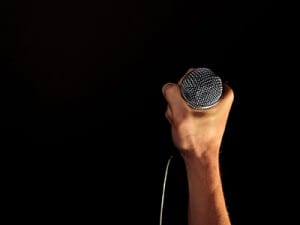What has the digital age done to writing?
This year, One Day in the City, a biannual celebration of London and literature, was the grand finale of UCL’s Festival of Culture. This day of panel discussions and other activities set out to explore the role of writing in the digital age.
With rise of the internet and social media, some predicted the demise of long-form writing and journalism, assuming that people’s attention spans were being irrevocably shortened by screen glare and distractions. The past few years, however, have seen a resurgence in which all the panel members at ‘Long-Form Essays in the Digital Age’ have had a hand.

Puffins are a clue to the secrets of sharing long-form
Mary-Kay Wilmers co-founded the London Review of Books (LRB) in 1979 with the late Karl Miller, then head of UCL’s English department, and has been its editor for almost 25 years. Andrew O’Hagan is the LRB’s editor-at-large and his most recent novel, The Illuminations (2015), was longlisted for the Man Booker Prize and is being turned into a drama serial for the BBC.
Ben Eastham is co-founder and editor of The White Review, a magazine on literature and the visual arts. Sarah Howe, a Leverhulme Fellow at UCL, is a poet and academic whose poetry collection Loop of Jade is the first debut to win the T.S. Eliot Prize. Howe also founded co-founded of Prac Crit, an online journal of poetry and criticism and chaired the session. She began by asking the panellists, ‘what is long-form journalism and how does the essay fit in?’
There was a consensus that ‘long-form’ is in some sense a negative or pejorative term, used as it is to categorise anything on the internet much longer than a couple of thousand words. Reflecting on the history of long-form essays, Andrew O’Hagan insisted that long-form journalism is “the most exciting form because it forces you to place your imagination aside, you can’t get away with making things up.” This was even more the case when you had to go out and find the facts, instead of getting them from the internet.
Mary-Kay Wilmers had some crucial insights, including that going online has changed what the London Review of Books publishes, but that writing on computers has made writers “less careful and more expansive”; that she does think you can engage properly with long-form on an iPhone; and that the crucial question at the LRB still remains whether you should hyphenate or not. (For the purposes of this article I have stuck to the title and used ‘long-form’ and not ‘longform’.)
The internet and social media emerged as in some ways restrictive, in some ways expansive. Ben Eastham said that The White Review was founded in part out of frustration after working at the BBC, where the emphasis was all on reducing your copy for social media consumption, which he called a “boring style of writing that confirms prejudice”. He, therefore, closely associates long-form with “digression, and what was lost”.
Mary-Kay Wilmers said that she finds the internet restrictive because you are constantly being directed by links and other suggestions to what you should read next: you are constantly being “spoonfed”, instead of using your own curiosity and imagination.
To this, Ben Eastham added that social media, and what it suggests you read, always tends to reflect your own political views back at you, since you tend to friend and follow people who share your interests.
So you are less likely to read something that challenges or surprises you as you would be if you were looking through physical publications in a shop.
But the internet also reaches out to new audiences, because of single article reads. This has meant that the LRB has expanded exponentially, pointed out Andrew O’Hagan, and its readership has gone up from 18,000 to 70,000.
“There are a lot of single pieces that will be read by hundreds of thousands of people,” he said, such as Seymour Hersh’s ‘The Killing of Osama bin Laden’.
“The paper’s universe has changed enormously in that way. The internet is producing untold numbers of people who think of it as an important resource.”
Perhaps one of the toughest challenges for long-form in the digital age is competing for attention among all the memes, retweets, loops and animals. There was strong agreement with Mary-Kay Wilmers’ belief that it is important not to think too much about which long-form articles will go viral.
Nicely demonstrating this point, Ben Eastham told us how the editors of The White Review had been puzzled by the popularity of an essay they’d published by ‘an obscure Icelandic poet’, which was their most read article in three years. Eventually they discovered this was because the author had mentioned eating puffin… and memes of Icelandic people eating puffins had gone viral.
The session moved on to the role of the author. ‘Confessional criticism’ emerged as somewhat self-indulgent. Mary-Kay Wilmers joked that the ‘death of the author’ was followed quickly by the life of the reviewer.
Andrew O’Hagan neatly distinguished between narcissistic writing and essays that make their own writing part of the telling: “the neurosis of a writer’s life should be invested in a piece”. He also talked of the excitement of long-form journalism, when you know you have gathered the depth of material to create a scene in a novel ̶ except that it is all real.
This prompted a return to Sarah Howe’s crucial opening question as to the definition of long-form. “This might be what long-form is, said Ben Eastham, “applying narrative techniques to essay writing and journalism.”
![]() Written by Tom Butler (UCL Philosophy)
Written by Tom Butler (UCL Philosophy) In reaction to the political confusion that has occurred following the UK’s decision to leave the European Union, a Q&A session was arranged to provide some clarity about what Brexit means for UCL’s staff and students.
In reaction to the political confusion that has occurred following the UK’s decision to leave the European Union, a Q&A session was arranged to provide some clarity about what Brexit means for UCL’s staff and students. Close
Close



 You would be hard pushed to find a positive thing to associate with ISIS, but the terrorist group certainly knows how to generate a lot of interest, as we saw at this year’s UCL Festival of Culture session ‘The ethics of fighting ISIS’. Attendees squeezed in next to each other without a seat to spare. It was clear from the start that this would not be a ‘death-by-PowerPoint’ session and the audience were faced with some ethical conundrums.
You would be hard pushed to find a positive thing to associate with ISIS, but the terrorist group certainly knows how to generate a lot of interest, as we saw at this year’s UCL Festival of Culture session ‘The ethics of fighting ISIS’. Attendees squeezed in next to each other without a seat to spare. It was clear from the start that this would not be a ‘death-by-PowerPoint’ session and the audience were faced with some ethical conundrums.
